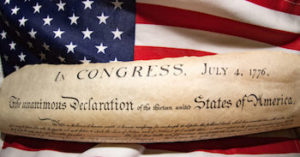
On this date, in 1776, the Declaration of Independence was adopted. This document and the Articles of Confederation were approved by the Second Continental Congress in July 1776 and November 1777, respectively, and sent to the states for ratification. John Witherspoon, Henry Laurens, and other slave owners signed this document. The Declaration of Independence affected Black Africans in America in two significant ways, distinct from other U.S. citizens:
First was the role slavery played in drafting the document; second, the Declaration contains a promise of liberty and equality that was (is) unfulfilled for Black African Americans before the American Civil War and only partially fulfilled since. In his original draft of the Declaration, Thomas Jefferson (a slave owner) condemned King George II of England for supporting the slave trade and imposing it on the Virginians. This provision led to the myth that he attempted to attack slavery in the Declaration. Instead, Jefferson’s attack focused on the slave trade.
In his draft, he complained that the King had “waged cruel war against human nature itself, violating its most sacred rights of life and liberty” by continuing the African slave trade. Jefferson also condemned the King for encouraging slaves to enlist in the British army, “exciting those very people to rise in arms among us, and to purchase that liberty of which he has deprived them, by murdering the people on whom he also obtruded them: thus paying off former crimes committed against the LIBERTIES of one people, with crimes which he urges to commit against the LIVES of another.” This was about Lord Dunmore, the royal governor of Virginia. Congress deleted this section written by Thomas Jefferson.
It is a fair assumption that Jefferson, the primary author of the Declaration, never intended “equality” to extend to blacks. While writing the document, he owned more than 175 slaves. Many Englishmen read the Declaration and wondered, as did Samuel Johnson, “How is it that we hear the loudest yelps for liberty among the drivers of Negroes?” In 1863, the promise of liberty remained unfulfilled.
The 1964 Civil Rights Act, which Congress passed and President Johnson signed, outlawed segregation in schools, public places, and employment. Johnson signed the bill, then allegedly put down his pen and said, "We have lost the South for a generation."
In 2025, this date marks America's 249th birthday. The promise of liberty has remained unfulfilled for decades, and despite significant progress, many would argue that for most descendants of American Slavery, it still is unfulfilled in the 21st century.